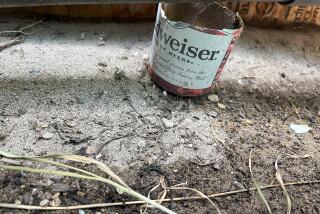Prop. 65’s warning signs of chemical hazards may require more detail
The ubiquitous, state-mandated warning signs about potential chemical hazards in bars, gas stations, parking garages and dozens of other locations may be in for a change.
Acting on orders from the governor, a state science agency is working on proposed regulations to make those generally ignored placards more meaningful to consumers. But not everybody’s on board.
The warnings about chemicals known to the state of California to cause cancer, birth defects or reproductive harm have been a mainstay of environmental law since voters passed Proposition 65 in 1986.
The goal is to provide “more useful information to the public about what they are being exposed to and how they can protect themselves,” said Sam Delson, a spokesman for the Office of Environmental Health Hazard Assessment. Perhaps the most controversial part of the proposal would require special, more detailed warnings for 12 chemicals out of the more than 800 already on the office’s Proposition 65 list.
The new category, already dubbed the “dirty dozen” by some critics, includes “the most common, most prevalent, most significant hazards to public health and most recognizable,” Delson said.
Among them: arsenic, benzene, cadmium, formaldehyde, lead, mercury and tobacco smoke.
The others are acrylamide, a byproduct of roasting or frying starchy food such as potatoes; chlorinated tris, a flame retardant; 1,4-dioxane, an industrial solvent and ingredient in some paints and cosmetics; phthalates, a plastic softener found in some cosmetics and beverage containers; and toluene, a component of household aerosols, nail polish and paints.
Business associations and lobbyists don’t like the special treatment. More than 80 groups including the California Chamber of Commerce and the Vinyl Institute filed negative comments with the state. According to Anthony Samson, a chamber lobbyist, the current draft has three strikes against it:
The “sheer cost” for businesses to comply, the likelihood of alarming consumers more than informing them and the possibility of increased litigation.
Online poker
After five years of trying, Indian tribes hope to make 2015 the year that state-regulated online poker comes to California.
That’s the goal of a newly expanded coalition of two gaming tribes, three card clubs and an online gambling company.
“We’re working to pass legislation,” said Matthew Cullen, chief executive of the digital division of the San Manuel Band of Mission Indians in Highland. “We want to see online poker legalized in California and done the right way.”
San Manuel has linked up with the Morongo Band of Mission Indians in Banning and with the Commerce Club, the Hawaiian Gardens Casino and the Bicycle Club in Bell Gardens. The corporate member of the coalition is Amaya Gaming Group of Toronto.
More to Read
Inside the business of entertainment
The Wide Shot brings you news, analysis and insights on everything from streaming wars to production — and what it all means for the future.
You may occasionally receive promotional content from the Los Angeles Times.







